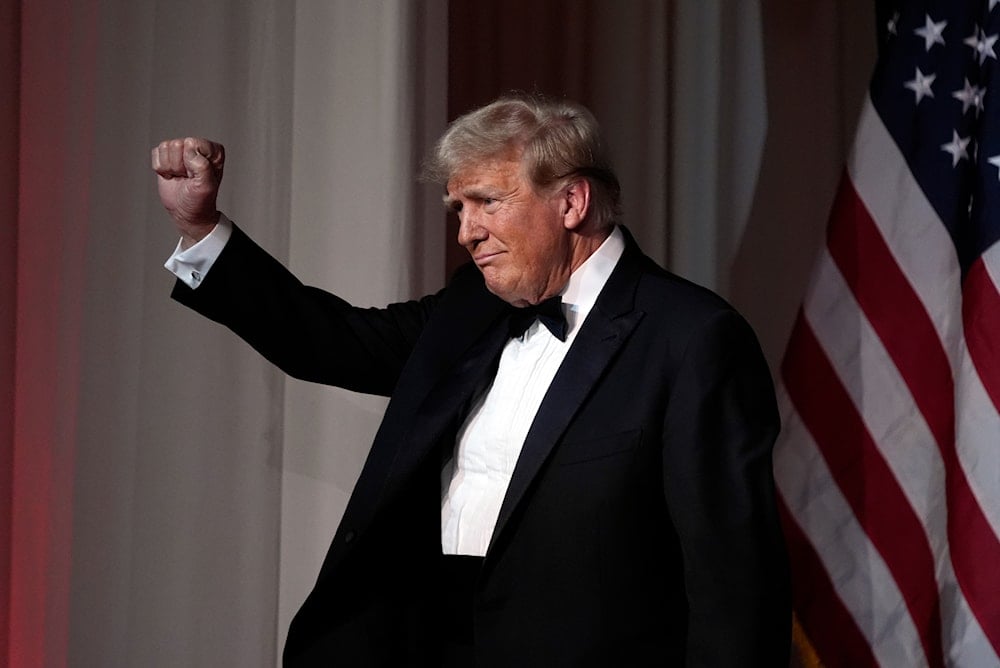Trump vows 25% tariffs on Mexico, Canada and deeper tariffs on China
The US imports a significant portion of its goods from Canada and Mexico, raising concerns among construction economists about the potential impact of tariffs on material prices.
-

President-elect Donald Trump gestures after speaking during an America First Policy Institute gala at his Mar-a-Lago estate, November 14, 2024, in Palm Beach, Florida. (AP)
Donald Trump has announced plans to sign an executive order imposing a 25% tariff on all goods imported from Mexico and Canada if he is re-elected president. He also intends to impose additional tariffs on China, claiming their exports to the US will be targeted until China (alongside Mexico) addresses issues such as fentanyl trafficking and illegal immigration.
Trump said in a post on his Truth Social platform, “On January 20th, as one of my many first Executive Orders, I will sign all necessary documents to charge Mexico and Canada a 25% Tariff on ALL products coming into the United States, and its ridiculous Open Borders."
Trump said the tariffs would remain in place until the two countries clamp down on drugs, particularly fentanyl, and migrants crossing the border illegally.
He announced in a follow-up post that the US "will be charging China an additional 10% Tariff, above any additional Tariffs, on all of their many products coming into the United States of America."
He attributed the additional tariffs on China to its alleged failure to reduce the flow of drugs, particularly fentanyl, into the US, China is a key supplier of precursor chemicals used by drug cartels, including those in Mexico, to produce fentanyl, a dangerous synthetic opioid that has contributed to the opioid crisis in the United States.
“I have had many talks with China about the massive amounts of drugs, in particular, Fentanyl, being sent into the United States – But to no avail … Until such time as they stop, we will be charging China an additional 10% Tariff, above any additional Tariffs, on all of their many products coming into the United States of America,” he said.
'No one wins the trade war'
In response to Trump's threats, China warned that a trade war would result in no winners. Liu Pengyu, a spokesperson for the Chinese embassy, emphasized that China had already taken steps to address drug trafficking following a 2023 agreement between President Biden and President Xi Jinping.
In a statement, he said, “The Chinese side has notified the US side of the progress made in US-related law enforcement operations against narcotics,” adding, “All these prove that the idea of China knowingly allowing fentanyl precursors to flow into the United States runs completely counter to facts and reality.”
Canada’s Deputy Prime Minister Chrystia Freeland reiterated Canada’s commitment to securing its border with the US. In parallel, US President Donald Trump and Canadian Prime Minister Justin Trudeau held a phone conversation about trade and border security, as reported by a Canadian source to Reuters.
Freeland’s statement did not specifically address the proposed tariffs but underscored the continued cooperation between Canadian and US agencies, such as the Canada Border Services Agency, the US Drug Enforcement Administration, and US Customs and Border Protection. She highlighted their ongoing efforts to tackle the flow of fentanyl, which is trafficked from China and other sources.
Read next: China calls for lifting of US tariffs in 'rational' trade talks
Bill Ackman, the chief executive of the New York-based hedge fund Pershing Square Capital Management, said on X, “Donald Trump is going to use tariffs as a weapon to achieve economic and political outcomes which are in the best interest of America, fulfilling his America first policy. This is a great way for Trump to effect foreign policy changes even before he takes office.”
Trump's comments led to significant market reactions: the US dollar reached its highest level since July against China's yuan, rose nearly 2% against the Mexican peso, and hit a four-and-a-half-year high against the Canadian dollar. Asian stock markets and European shares also saw declines in early trading, reflecting investor concerns over the potential economic impact of the proposed tariffs.
Countries often retaliate against tariffs by imposing their own, potentially sparking trade wars. This occurred during Trump’s first presidency when US-China tariffs disrupted economies on both sides, raising costs for businesses and consumers.
“A tariff is basically a sales tax, raising the price of almost everything you buy. It’s also regressive – taking a higher percentage out of the paychecks of working people than out of the wealthy,” Robert Reich, a former US secretary of labor, posted on social media.

 4 Min Read
4 Min Read








